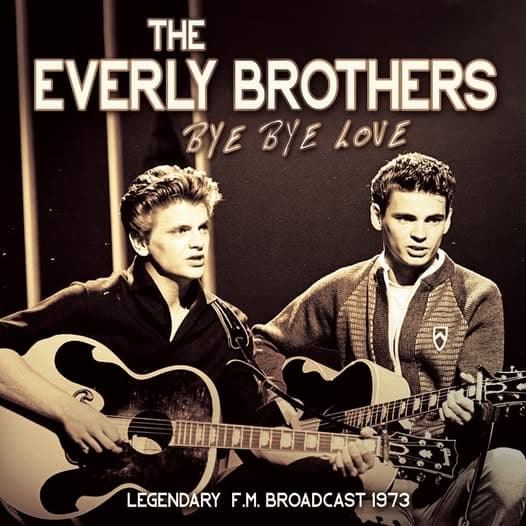
An Enduring Anthem of Heartbreak and Hand-Wringing
The Everly Brothers’ Breakthrough and the Dawn of Harmony Pop
Ah, the late 1950s. A time when the sonic landscape was shifting beneath our feet, embracing the rebellious energy of rock and roll while still yearning for the sweet, melodic balm of a perfect harmony. Into this exciting, nascent era stepped two young men from Kentucky, Don and Phil Everly, forever changing the texture of popular music with their breathtaking, close-harmony style. The song that truly catapulted them from regional radio to global stardom, etching their names into the bedrock of American music, was the unforgettable “Bye Bye Love.”
Released in the spring of 1957, this seemingly simple, infectious tune became an instant classic and a massive commercial success, marking their breakthrough hit. It soared up the charts, peaking at Number 2 on the prestigious Billboard Top 100 (a chart that would soon be renamed the Hot 100), but its reign didn’t stop there. It hit Number 1 on the Billboard Country and Western chart, underscoring its broad appeal, and captivated audiences across the pond, reaching a stellar Number 6 on the UK Singles Chart. The song was not an album track upon release but a standalone single, later included on their self-titled debut album, The Everly Brothers, demonstrating its immediate and overwhelming importance to their career.
The Unlikely Origin and the Wrenching Meaning
Now, for the story behind the song—a narrative thread that’s as compelling as the melody itself. It’s often assumed that the Everly Brothers penned their own material, given how seamlessly their voices fit the narrative, but this gem was the work of two songwriting stalwarts: Felice and Boudleaux Bryant. The Bryants were a husband-and-wife team known for crafting hits for country artists, and they presented “Bye Bye Love” to the Everlys’ producer, Chet Atkins, at a time when the young duo needed a distinctive track. Surprisingly, the brothers were initially hesitant about the song. They felt it was too country, a feeling exacerbated by the inclusion of the line “I’m a-gonna get a letter from the mailman,” which they found clunky. Yet, under the persuasion of Atkins, they recorded it, and the rest, as they say, is history, proving that sometimes the best artistic choices are the ones that push us slightly outside our comfort zone.
At its core, “Bye Bye Love” is a quintessential anthem of youthful, world-weary heartbreak. It’s not a song about the dramatic, tragic end of a great romance; rather, it captures the aching, everyday resignation of a young man watching his love interest—and thus, his future happiness—walk right out of his life. The lyrics are deceptively straightforward, employing simple, relatable language to convey a massive emotional blow: “Bye bye love, bye bye happiness, hello loneliness, I think I’m gonna cry.” This juxtaposition of the catchy, almost upbeat melody with the desolate, hand-wringing lyrics is the very genius of the song. It’s the sound of whistling past the graveyard of one’s own ruined expectations. It captures that feeling we all know so well, when you try to be stoic, even cheerful, about a loss that is tearing you apart inside.
The Enduring Legacy of the Sound
What truly sets this recording apart is the Everly Brothers’ revolutionary vocal arrangement. Their signature sound—Don typically handling the lower harmony, Phil soaring with the higher part, often singing in very close intervals—was a sound that felt both ancient, like a mountain folk tune, and utterly modern. They were one of the first acts to truly commercialize the use of two guitars—acoustic rhythm and electric lead—in a pop context, with Don Everly’s driving acoustic strumming providing the essential rhythmic pulse. This specific blend of country sensibility, rock and roll energy, and peerless vocal artistry made “Bye Bye Love” a touchstone, influencing everyone from The Beatles and Simon & Garfunkel to countless folk-rock acts that followed. It’s a track that doesn’t just transport us back to the sock hops and soda fountains of the fifties; it reminds us that some feelings—the pain of a goodbye, the sting of loneliness—are truly timeless. It remains, nearly seven decades on, a powerful testament to the enduring simplicity and emotional depth of a perfect pop song.